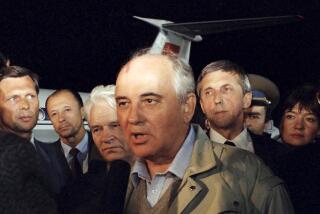Gorbachev Assails Slow Pace of Reform, Ousts Leningrad Party Boss
- Share via
MOSCOW — President Mikhail S. Gorbachev, demonstrating the Communist Party’s new commitment to respect the will of the people, Wednesday replaced the Leningrad party boss who lost in spring elections and sharply criticized the city’s party organization for sitting idly by while his policies of reform are stirring emotions on the street.
Gorbachev, who traveled to the Soviet Union’s second-largest city to preside personally over the change in party officials, announced that Yuri F. Solovyov, a candidate, or non-voting, member of the Politburo, had been replaced by Boris Gidaspov as first secretary of the Leningrad regional party committee.
“Life is boiling up in Leningrad--political, social, economic, inter-ethnic,” Gorbachev said in a remarkable Soviet television interview with Solovyov and Gidaspov sitting on either side of him.
“But at the same time, the participants of party meetings said very often, at sittings of party organizations, ‘There is nothing going on.’ How can this be? Something strange is going on,” Gorbachev said. “The problems heard on the street and in the square should be discussed by party organizations.”
In replacing Solovyov, 63, Gorbachev was for the first time making good on a promise he made a year ago to rid the party of officials who failed to gain public support in March elections to the 2,250-member Congress of People’s Deputies.
Lost Even Though Unopposed
Solovyov, who has served of Leningrad’s party chief for the last four years, managed to run unopposed but still could not garner the needed 50% of the vote when voters crossed his name off the ballot. Eleven other members of the city’s party leadership also lost.
It appeared likely that Solovyov also will lose his job in the 20-member Politburo, a position he was given in March, 1986.
Gorbachev, by overseeing the job switch himself, sent a clear signal to the country that he is personally committed to honor the popular mandate, no matter how high ranking the party official, and that he will no longer permit party and government wishes to be imposed from above.
The replacement was seen as necessary if the party is to be viewed by the people as keeping pace with what Gorbachev has called the “process of democratization.” Gorbachev himself called Solovyov’s replacement a critical step in “the internal life of the entire party.”
The elections in March clearly showed that party officials in most regions had virtually no popular support, often because they were viewed as being either passive or active opponents of change. Gorbachev’s move also served as a warning to those officials.
“The first step the party took was to launch perestroika ,” Gorbachev said, referring to his efforts to reform his country economically, socially and politically.
“In the second stage of the process, we now understand that not everything is right with the party,” he said. “The party is lagging behind the process of perestroika. The reform of the party is going too slowly.”
Gorbachev Spoke at Plenum
The decision to remove Solovyov was made at a regional party plenum. The official news agency Tass said Gorbachev spoke at the plenum but gave no details of what he said. It said the Communist Party’s personnel chief, Georgy Razumovsky, was also present.
Gorbachev and Razumovsky flew to Leningrad on Tuesday to oversee the leadership reshuffle after months of political turbulence in the city.
Leningraders, like many Soviets, have taken advantage of Gorbachev’s policy of glasnost, or openness, to complain about problems ranging from shortages of food and housing to pollution.
But many of those problems are more acute in Leningrad, both because of its size and because the city leadership, traditionally conservative, has been less responsive than in many regions to complaints.
Gorbachev said workers he met in Leningrad stressed that despite his policies of reform, in their city they felt “we have not yet rid ourselves of the chains.”
Solovyov said after the March election that he had learned from his loss. But in a Communist Party Central Committee meeting in April, he drew a sharp rebuke from Gorbachev when he complained that the party was becoming “a discussion club.”
Television Interview
The ousted leader appeared calm as he sat next to Gorbachev during the television interview. In response to a question, he said the biggest challenge his successor will face will be to “increase the role of the party along democratic lines . . . and to eliminate its complacency.”
Gidaspov, 56, the director of a state industrial concern, defeated more than 20 opponents to win a seat in the Congress of People’s Deputies.
Smiling broadly during the television interview, he said the plenum decision to name him party boss was a surprise. He promised to meet the demands of various interest groups and to see that the crumbling facades of historic buildings in Leningrad, the seat of the Bolshevik Revolution, “be restored as a pearl.”
More to Read
Sign up for Essential California
The most important California stories and recommendations in your inbox every morning.
You may occasionally receive promotional content from the Los Angeles Times.













